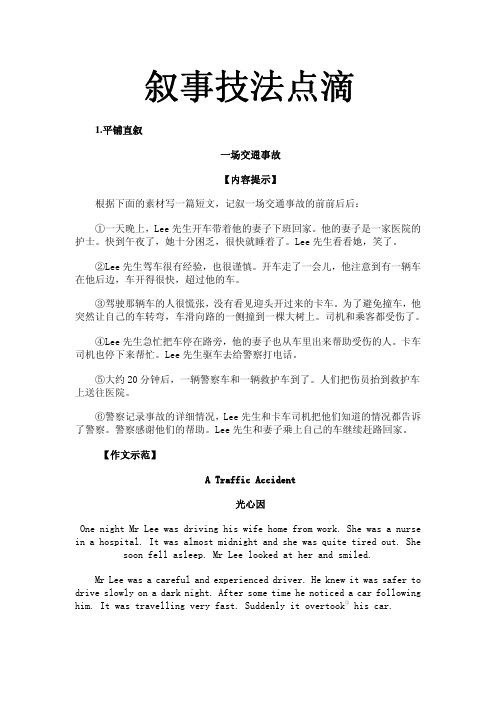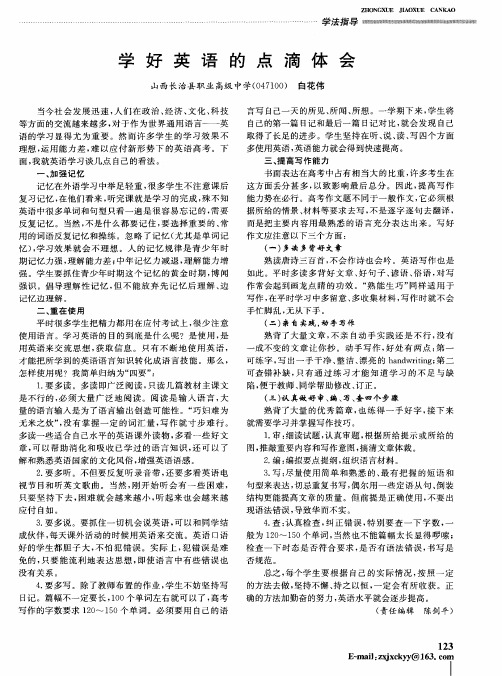我的英语点滴
- 格式:docx
- 大小:12.74 KB
- 文档页数:2

叙事技法点滴1.平铺直叙一场交通事故【内容提示】根据下面的素材写一篇短文,记叙一场交通事故的前前后后:①一天晚上,Lee先生开车带着他的妻子下班回家。
他的妻子是一家医院的护士。
快到午夜了,她十分困乏,很快就睡着了。
Lee先生看看她,笑了。
②Lee先生驾车很有经验,也很谨慎。
开车走了一会儿,他注意到有一辆车在他后边,车开得很快,超过他的车。
③驾驶那辆车的人很慌张,没有看见迎头开过来的卡车。
为了避免撞车,他突然让自己的车转弯,车滑向路的一侧撞到一棵大树上。
司机和乘客都受伤了。
④Lee先生急忙把车停在路旁,他的妻子也从车里出来帮助受伤的人。
卡车司机也停下来帮忙。
Lee先生驱车去给警察打电话。
⑤大约20分钟后,一辆警察车和一辆救护车到了。
人们把伤员抬到救护车上送往医院。
⑥警察记录事故的详细情况,Lee先生和卡车司机把他们知道的情况都告诉了警察。
警察感谢他们的帮助。
Lee先生和妻子乘上自己的车继续赶路回家。
【作文示范】A Traffic Accident光心因One night Mr Lee was driving his wife home from work. She was a nurse in a hospital. It was almost midnight and she was quite tired out. She soon fell asleep. Mr Lee looked at her and smiled.Mr Lee was a careful and experienced driver. He knew it was safer to drive slowly on a dark night. After some time he noticed a car following him. It was travelling very fast. Suddenly it overtook① his car.The driver of the car was in a hurry. He did not see the approaching lorry. To avoid hitting it, he suddenly tuned his car. It skidded② off the road and hit a big tree. The driver and his passenger wereinjured③ .They were badly cut by glass from the broken windscreen④.Mr Lee quickly stopped his car by the side of the road. His wife got out of the car to help the injured. The lorry driver also stopped to help. Mr Lee drove off to telephone the police .About twenty-five minutes later, a police car and an ambulance⑤arrived. The injured were carried into the ambulance and taken to hospital.The policemen took down details of the accident. Mr Lee and the lorry driver told them all they could remember. The policemen thanked them for their help. Mr and Mrs Lee got into their car and continued their journey home.【词语解释】① overtake [?+uv+'teik] v. 追上;赶上;超过②skid[skid] v. (汽车等)打滑;滑向一侧③injure['ind N+] v. 损害;伤害 the injured(事故中的)受伤者④ windscreen['windskri:n] n. (汽车等的)挡风玻璃⑤ ambulance['$mbjul+ns] n. 救护车【写法指要】这篇文章按时间顺序平铺直叙地写出了事故发生的前前后后,表达了故事中的人们不顾疲倦抢救伤员的互助友爱精神。


英语学习心得体会1.英语学习心得体会1通过这次学习《英语新课程标准》,使我受益匪浅,特别是在理论方面:1、《英语课程标准》明确指出,英语课程要面向全体学生,注重素质教育。
课程特别强调要关注每个学生的情感,激发他们的学习兴趣,帮助他们建立自信。
在英语学习的过程中,发展有效的学习策略,强化祖国意识,开拓国际视野,形成一定的综合语言运用能力。
2、课标具有强烈的工具性和人文性,就这一特点,我们作为教师要树立为学生终身发展的思想,坚持以人本位、以生为本,就是以学生为教学的主体,就是要把学生看成有思想、有情感的人,而不要把他们看成学习的容器,因为他们也有喜怒哀乐,有个人的追求,有对事物的看法,有自己的情感经历,这些正是搞好教学的基础。
这就要求我们的教师在备课时就要考虑学生的这些经历、情感、思想和认识,从而激活他们的这些实践经验,让他们积极主动地参与到教学活动中来,从而最大限度地发挥他们的主体作用,把旧课堂的“要我学”变为新课堂的“我要学”,适时地激发他们的学习热情,培养他们的学习兴趣,让课堂真正成为有趣、有序、有效的课堂。
所有这些理论和要求,都需要我们在日常的工作中结合实际课堂教学进行自主分析和灵活应用。
下面我就谈谈本人对英语教学的一些看法:1、教师要具有良好的教学行为和积极的心态。
众所周知,言教重在身教,教师的一言一行学生看在眼里记在心上。
比如课前提前进入教室与学生进行交流沟通,为本堂课奠定教学氛围,不要匆忙上阵。
2、根据新课标的要求,新教材的教学必须适合小学生的年龄特点,采用活动途径,在动态中教学,力求采用听、说、读、演、玩等多种方式,重点培养学生用英语进行交际的能力,鼓励学生积极参与课堂教学,大胆表达。
教师不要满堂灌或是一言堂,不给学生思考和表现的'机会。
课堂内容也应该丰富多彩,让学生在轻松自然的氛围中习得知识。
3、教师要善于运用鼓励性语言,允许学生犯错误,不带否定性评价。
即使是学生回答错了,也不要急于给出否定,而是适时调整自己所设计的问题,降低难度。

人文英语学习自评英语学习自我评价篇1虽是英语专业的学生,却一直不知道该怎么学英语,找到一个方法,没坚持几天就放弃了,以至于到现在英语水平还不咋的,提到英语时很不自信。
有时想想,一个英语专业的学生,英语不行,真的是挺可悲的。
整天混迹在大学校园,偶尔拿六级和专四成绩来安慰自己,实际上是在自欺欺人。
考试成绩并不能反映一个人的真正的英语水平,成绩高只能说明自己擅长考试。
想到这儿都有些“痛恨”这么多年来的英语学习,甚至连“学习”都称不上,纯粹为了应付各种各样的考试,浪费了很多时间。
从初中到大学一直在学,仍旧学的一滩糊涂,时间不是问题,根源在于方法不对,从启蒙阶段就缺乏正确的引导,走入了一个误区,而且越走越远,以至于出现了今天这种局面。
基础知识很不扎实,听、说、读、写、译没有一样能拿的出手,非英语专业的都比我们强。
一直觉得听力和口语是我的弱项,但我没想到竟然会差到这种地步。
讲座期间老师给对我们在座同学的口译水平做了一个测试,我竟然只得了55分,作为英语专业大三的学生,竟然做成这样。
考试材料是一段40秒的VOA Special (Se1530news/All—in—1—min/AP news),我们用的是最低一级的Se1530news,听三遍之后我们用五分钟的时间将其译出,在未开始之前我还挺自信的,因为我们大一时听的是voa special,大二时老师就让我们听standard了,还推荐我们听CNN BBC NPR,而大三我们没听力课了,平时泛听时听的是CNN(studens on the news),没觉出有太大的问题,但经过今天的测试,我不得不对自己的学习进行深刻的反思。
从学英语开始,一直被老师牵着鼻子走,从未想过哪种方法是真正适合自己的,为了考试而学英语,过分的关注数量而忽略了质量,过度的看重结果,未用发展的眼光看问题。
两个人的考试成绩一样,并不代表他们的在同一水平线上。
学英语是不能偷懒的,如果基础不行,越往后学会越吃力,地基没打好,盖起来的楼房早晚会倒塌的,这只是一个时间问题。

平行班英语教学的点滴体会佘清华英语有一则谚语说:“良好的开端,是成功的一半。
(A good beginning is half done)。
”融洽的师生关系,为英语教学奠定了良好的基础。
1.帮助学生树立学好英语的自信心:进入中学时,“平行班”的学生由于在学习上遭受过挫折和失败,不少人对英语学习失去了兴趣和信心,有些学生甚至产生了“破罐子破摔”的想法。
由于学习成绩不好,被同学看不起,被家长训斥,被老师歧视,因此他们普遍对学习、对老师都有一种天然的抵触情绪和恐惧心理,另一方面,他们也同样具有自尊心和渴望进步的要求。
为了打消学生的心理障碍,尽快缩短师生之间的感情距离,树立他们学好英语的自信心,我从学生进班的那天起,便亲切、主动接近他们、找他们谈心、了解每个学生的学习情况、甚至家庭情况,以便发现学生的特点,做到心中有数,同时帮助他们分析、查找没有学好英语的原因,进行英语学习的心理疏导,并把重点放在培养学生的勤奋、和谐、自信、进取、乐观、朝气蓬勃的性格上。
2.把自己的亲和力根植在学生的心中、营造和谐的师生关系、赢得学生的最先信任和肯定在英语教学中,注意努力营造和谐、生动的课堂教学气氛,让学生在轻松、愉快的心情中学习英语,对学生一视同仁,平等地对话交流,学生的点滴进步都给予充分肯定和表扬,即使对课堂上犯错误的学生,也多是课后善意的批评,从不大声训斥,任何时候都不使用侮辱学生人格和伤害学生自尊心的语言,即便是学习很差的学生也不歧视。
我还经常主动征求学生对教学的意见。
采纳他们提出的合理建议;改进教学中存在的问题和不足,发现有自己过错,就向学生公开道歉,让学生时刻感受老师的真诚关怀及殷切希望。
在这种和谐、亲切的学习气氛中,学生的精神压力减少了,喜欢上英语课的学生多了,大胆发言的学生多了,主动找老师请教问题的学生多了,找老师谈心的学生多了,渐渐地老师和学生之间建立起了一种相互理解、相互信任、相互尊重的朋友式的师生关系,真诚和微笑缩短了师生间的距离。

我的英语学习经历范文英文回答:Throughout my academic and personal journey, English language acquisition has played an integral role in shaping my cognitive abilities, communicative skills, and global perspective. My English learning experience has been a multifaceted and transformative journey that has spanned diverse settings and methodologies.In my early childhood, I was immersed in a predominantly Spanish-speaking environment. However, my exposure to English began through cartoons, movies, and music. These captivating audiovisual experiences sparked within me a fascination for the language and its rich vocabulary. I eagerly sought out opportunities to interact with English speakers, often initiating conversations with tourists or language exchange partners.During my primary school years, formal English languageinstruction commenced. I immersed myself in grammar rules, vocabulary building, and reading comprehension. The structured lessons provided a solid foundation upon which to develop my language skills. As my proficiency grew, I began to appreciate the nuances of the English language and its ability to convey complex ideas with precision.Beyond the classroom, I actively engaged with English literature, poetry, and journalism. I found solace and inspiration in the written works of renowned authors, whose words ignited my imagination and expanded my understanding of the world. Joining a local English literature club fostered my critical thinking and analysis skills, as I engaged in discussions and debates with fellow enthusiasts.As I progressed through secondary school, my English learning journey took on new dimensions. I embraced opportunities to participate in international exchange programs and summer camps, where I interacted with students from diverse cultural backgrounds. These experiences exposed me to a vast array of English accents and dialects, broadening my linguistic repertoire and deepening myunderstanding of the globalized nature of the language.Moreover, I delved into the complexities of English grammar and syntax. I reveled in the intricacies of sentence structure, verb tenses, and conditional clauses. This deeper understanding enabled me to communicate with greater clarity and confidence.In parallel with my academic studies, I pursued extracurricular activities that further honed my English language abilities. I joined the school's debate team, where I developed my public speaking skills and learned to articulate my ideas effectively. I also participated in drama productions, immersing myself in the theatrical world where language became a powerful tool for conveying emotions and storytelling.中文回答:我的英语学习之旅始于孩提时代,那时我沉浸在以西班牙语为主的环境中。
→have a heart:发慈悲eg.Hey, Dad, have a heart and let me use the new car; I have this big date with Jennie tonight.→lose one's heart to someone:爱上某人→cross my heart:发誓,保证eg.Billy, cross my heart, it wasn't me who broke your bicycle.→have one's heart inthe right place:心眼挺好;富有同情心eg.I don't always do what is right ,but I have my heart in the right place.→my heart stood still:惊恐,吓得心脏都几乎停止跳动eg.My heart stood still when the other car ran through the red light and I knew we were about to crash.→heart-to-heart:诚恳,贴心→my heart bleeds for you:我对你表示同情eg.My heart bleeds for you. I told you not to argue with the boss.→take to heart:认真对待…, 受到…影响或困扰eg.Don’t take my criticism to heart.别把我的批评放在心上。
→chicken-hearted:胆怯,胆小鬼egg in your beer,得寸进尺if you are patient in one moment of anger, you will escape a hundreddays of sorrow。
我的英语课作文英文回答:In the tapestry of life, language serves as anintricate thread that weaves together our experiences, connects us to others, and shapes our understanding of the world. It grants us the power to articulate thoughts, express emotions, and communicate ideas that transcend time and space. As we delve into the nuances of language, we unveil its profound impact on our cognitive, social, and emotional development.Language forms the foundation of our cognition. It serves as the scaffolding upon which we construct our thoughts, organize our knowledge, and make sense of the world around us. By assigning words to objects, actions, and concepts, we create mental representations that facilitate our comprehension and interpretation of reality. Studies have shown that language acquisition not only expands our vocabulary but also enhances our criticalthinking skills, problem-solving abilities, and memory.Moreover, language plays a pivotal role in our social interactions. It is the vehicle through which we communicate our intentions, negotiate meanings, and build relationships. By engaging in conversations, we share ideas, learn from others' perspectives, and forge connections that shape our sense of community and belonging. Language also serves as a marker of social identity, reflecting our cultural background, socioeconomic status, and group affiliations.Furthermore, language exerts a profound influence onour emotions. Words have the power to evoke powerful feelings, from joy and love to sadness and anger. Poetry, music, and literature all harness the emotive potential of language to create profound experiences that resonate with our hearts and minds. By expressing our emotions through language, we gain a deeper understanding of ourselves, find solace in times of adversity, and connect with others on an intimate level.In addition to its cognitive, social, and emotional significance, language also holds cultural and historical value. It preserves the traditions, beliefs, and knowledgeof a particular society, transmitting them from one generation to the next. Through written texts, oral histories, and artistic expressions, language serves as a cultural repository that connects us to our past, present, and future.In conclusion, language is an indispensable aspect of human life. It enables us to think, communicate, express emotions, and connect with others. It shapes our cognitive development, social interactions, emotional experiences,and cultural heritage. As we continue to explore the complexities of language, we gain a greater appreciationfor its profound impact on our individual and collective existence.中文回答:语言是生命中不可或缺的一部分,它就像一副错综复杂的挂毯,将我们的经历编织在一起,把我们与他人连接起来,并塑造我们对世界的理解。
学好英语课的点滴体会【摘要】在以往的教学经验中,有很多同学会提出这样的问题,英语很难学,听不懂。
听不懂基础差,原因有很多。
从学生的角度分析,一是他们对英语不感兴趣,自然而然产生疲乏和厌倦的情绪。
二是课堂表现沉默,思维不活跃。
思维不能跟随老师所讲的。
三是注意力不集中,容易开小差。
这就与平时的学习习惯有关了,由于平时就养成了没有自律性,抗干扰能力较差。
第四,对自己没有信心。
有些学生因为基础差,考试成绩保持原有水平,天长日久就会对自己越来越没有信心,这时要进行心理辅导,多给予关怀。
要转变学生的观念,就必须从以下几个方面入手。
【关键词】兴趣动静结合良好习惯自信【中图分类号】g633.41 【文献标识码】a 【文章编号】2095-3089(2013)02-0130-01第一,让学生对所学的内容感兴趣。
学生往往对符合自己能力水平的活动容易产生兴趣。
如果难度太大,会让他们失去信心,难度太小会让人困乏。
所以要设计适当的活动来引发学生的学习兴趣。
例如:英语教学中讲festival 这个话题时,可以通过大脑风暴,激发学生对节日的兴趣,学生就会说出许多与节日相关的话题,如节日名称,节日里做什么等。
以春节为例,学生可以在看过课文后,摘下好的句子。
1. the spring festival may take place in february. it is on lunar 1st of january.2. at the spring festival, people have plenty of food and fruit.3. people look forward to seeing their friends.4. people, especially children, will dress up during the spring festival.教师可以在学生广泛发表意见的基础上,补充学生没有说出的节日名称,如halloween, easter, thanksgiving day, valentine?蒺s day等,将有关节日名称简单处理一下。
小学英语教学中的点滴体会中图分类号:g62 文献标识码:a 文章编号:1007-0745(2012)05-0046-01摘要:八年的小学英语一线教学工作,让我体会最多的就是如何去激发孩子学习英语的兴趣。
孩子们只有对英语感兴趣,才能去认真学习和领悟。
几年的小学英语教学工作,我主要从激发孩子们的兴趣入手,在教学中将需要掌握的知识通过各种途径,手段表现出来,使孩子们学得有滋有味。
在课堂上我努力去激发孩子们的兴趣。
所以我认真去备好每一节课,寻找每一种适合孩子们学习的方法。
几年的一线教学经验,让我总结了一些得意之处,同时也反映了自己工作中的一些不足,我要认真反思自己,争取做一名优秀的人民教师。
关键词:兴趣体会反思八年的小学英语一线教学工作,让我体会最多的就是如何去上好每一节英语课,如何让孩子们对英语这一门学科感兴趣。
孩子们只有对英语感兴趣了,才能去认真学习和领悟。
几年的小学英语教学工作,我主要从激发孩子们的兴趣入手,合理的利用课堂40分钟,加强课后辅导。
在教学中将需要掌握的知识通过各种途径,手段表现出来,使孩子们学得有滋有味。
在教学的同时,我也注重自己的师德修养,用真诚去对待每一个孩子。
现将几年的教学经验与点滴体会做以下总结:一、努力让自己的课堂教学充满激情,激发学生的学习兴趣1.在热身活动中,我主要采取let’s sing ,let’s do , let’s chant 或daily talk等形式来吸引学生们的注意力,调动学生们的积极性,活跃课堂气氛,激发学生学习兴趣。
2.在单词教学中,当我讲到身体部位的单词时,我编了一首chant,eye eye 眨一眨;nose nose 闻一闻;mouth mouth 张一张;neck neck 扭一扭;arm arm 伸一伸;hand hand 拍一拍。
孩子们在动中学,兴趣盎然,气氛热烈,单词的学习在不知不觉中内化了。
在讲关于水果的词汇时,我把各种水果(apples,pears,bananas……)带进课堂,学生们高兴极了,让他们闻一闻,尝一尝,这样就很容易的记住了单词。
我的英语点滴
我未担任小学英语教师的工作时,我听过很多的课,老师们在课堂上滔滔不绝的说,学生们安静的在记和听,当时我特别羡慕他们的学生,孩子们能够安静的坐在自己的坐位上听老师讲课,我想以后我也会像他们一样有这样的学生,我不用再绞尽脑汁的为我的课堂做计划,不断增加新游戏,新亮点了。
可当事实摆在眼前时,我才感觉到我的想法是多么的愚蠢。
小学的课堂比起学前来更要难。
学前英语的教学针对的是3周至5周的孩子们,只要我们抓住了孩子们的兴趣,你的这节课会上的很精彩,同时孩子们的记忆力很短一个游戏你可以玩好几次,孩子们都不会烦,课堂上有捣乱的你稍加一批评,他就会表现的相当好。
而小学英语的教学针对的是6周至12周的孩子们,他们已经逐渐有了自己的想法,他们的内心世界你很难摸透,我记得当时我刚担任小学英语教师工作时,我按照原来学到的经验给我的学生讲课,但是整节课下来,我讲的很吃力。
后来我按照我在学前的方法给他们讲课,他们却听得津津有味。
可是他们的记忆力长,如果你的这个方法用个两三次还行,超过五次就不行了,而且用的这几次了,你得不断的变换模式,教具,学具得准备相当充分。
在我不断的实践、研讨中,我慢慢的知道了在教育我的学生们我不仅要要像对待学前孩子们一样,从他们的兴趣出发,让他们在学英语时感到快乐。
更要让他们学会学习。
,。